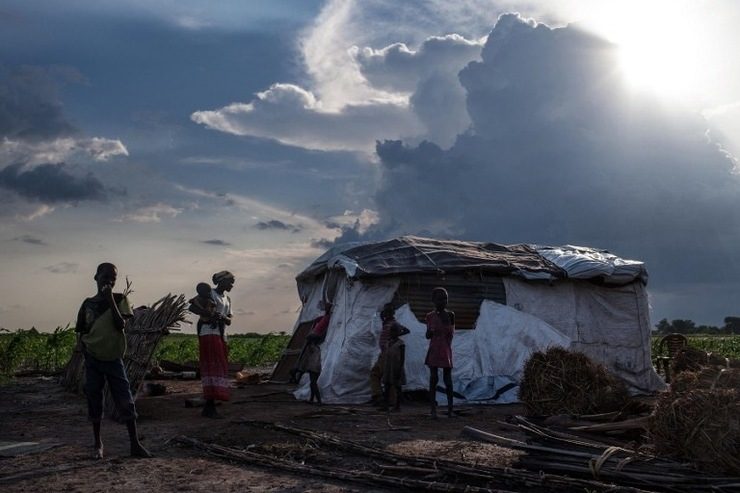SUMMARY
This is AI generated summarization, which may have errors. For context, always refer to the full article.

JUBA, South Sudan (UPDATED) – Thousands of South Sudanese waved flags at military parades to mark three years of independence Wednesday, July 9, despite having little to celebrate in a war-torn young nation ravaged by ethnic atrocities and threatened with famine.
The streets of the capital were lined with banners proclaiming “One People, One Nation”, as the government of President Salva Kiir put on a show of force with a military parade and speeches intended to celebrate the breakaway from the repressive government in Khartoum.
Security was heavy at the events, underscoring the bitter divisions in the world’s youngest nation where a nearly seven-month-old civil war rages on.
“It’s a sad anniversary,” admitted Juba resident Gideon, 23, saying he had hoped for better three years on from the fanfare and optimism that swept the country in July 2011.
At government-organized celebrations in the heart of capital, dance troupes draped in the national flag sang and danced, as drummers banged out beats to shrug off the mood of gloom.
Ugandan President Yoweri Museveni, who has sent in troops to prop up Kiir’s government, was one of the few senior regional leaders to attend, with old enemies Sudan sending their second vice-president.
“Let’s focus on peace, reconciliation and coming back together… I call on all of you to exert maximum effort to stop the bleeding in our nation,” Kiir told the crowds.
South Sudan has been wracked by war since mid-December, when presidential guards loyal to Kiir clashed with troops supporting ousted vice-president Riek Machar, who fled to the bush and rallied a huge rebel army.
The fighting has been marked by widespread atrocities against both members of the Nuer people, to which Machar belongs, and Kiir’s Dinka group, the single largest tribe.
‘Sick’ leaders
Civilians have been massacred and dumped in mass graves, patients murdered in hospitals and churches, and entire towns flattened as urban centers including key oil-producing hubs changed hands several times.
The most conservative estimates put the toll at 10,000 dead, although aid workers say the real figure is likely far higher.
Almost 100,000 civilians are sheltering in squalid camps inside UN bases fearing revenge attacks if they leave.
Aid group Oxfam said South Sudan was “currently Africa’s worst crisis with nearly four million – a third of the country’s population – at risk of severe hunger and an aid effort that has only so far reached half of those in need”.
“The world’s attention is elsewhere as Africa’s worst humanitarian catastrophe descends into more misery. We will be staring into the abyss and fail to avert a famine if funds do not start arriving soon to help the people of South Sudan at risk of starvation, disease and violence,” said Winnie Byanyima, Oxfam International chief.
“If the aid effort does not increase 50,000 children could die from malnutrition. Since the current crisis began in December last year fighting has forced 1.5 million people from their homes and numbers continue to rise.”
On the eve of the anniversary, the departing UN representative in South Sudan issued a scathing attack on the country’s leaders, calling them a “self-serving elite” responsible for a looming “man-made famine”.
“Thousands and thousands have been killed,” said Hilde Johnson of the UN mission in South Sudan, lashing out at both the government and rebels, warning that one of world’s least developed nations has “been set back decades”.
Leaders were sick with “the cancer of corruption” with the country’s billions of dollars worth of oil “a curse rather than a blessing”, she said.
Campaign group Global Witness said the government had borrowed the “monumental sum” of $1 billion this year from oil companies, much to “pay off last year’s debts”, and about the same amount the United Nations is appealing for donors to fund in terms of aid.
Peace talks in luxury hotels in the Ethiopian capital Addis Ababa have made little progress and last month they halted indefinitely, with both sides refusing to attend the discussions.
“If there are further delays… we can draw only one conclusion; that this is only about a scramble for power,” Johnson added. – Rappler.com
Add a comment
How does this make you feel?
There are no comments yet. Add your comment to start the conversation.